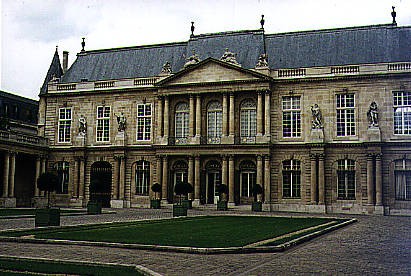The Museum of the History of France was created in 1867 by Napoleon III as a means of presenting to the public the most interesting and the most prestigious documents held in the National Archive. The National Archive itself was a creation of the Revolution but it was not until Napoleon 1st took a hand that in 1808 it found its permanent home in the town mansions (hôtels particuliers) Rohan and Soubise in the 3rd arrondissement. Following various enlargements, especially those built during the Second Empire, the National Archive is now open on the same site but in the vast custom-built research centre CARAN (or Centre d'Accueil et de recherches des Archive nationales) designed by Stanislas Fiszer and opened in March 1988.
And so the Museum of the History of France was installed in the Hôtel Soubise in1867. And since then the aim of the museum has been to present the often extraordinary documents in temporary exhibitions, so as to allow for a high turnover of material and also so as to limit the damage to fragile items.
To one side of the splendid apartments of the Prince and Princess Soubise (one the finest examples of 'rocaille' (French Romantic grotto work)), there is the main staircase, and at the first floor visitors are welcomed by bronze busts of Napoleon Ist and Léon de Laborde, the director general of the archive from 1857-1868.
The Salle des Gardes, at present, houses an exhibition on the French Revolution presenting documents relating to the period 1788-1797, notably letters, proclamations and engravings of relevance to the rise of Bonaparte in his military and subsequent political career. There is a decree from the Comité de Salut publique and from the Sûreté générale appealing to the young general to put down the Royalist uprising of 13th vendémiaire, year IV (5th October 1795). Next, the visitor is presented with a letter sent by Napoleon in Mantua to his wife Josephine, then a proclamation of 1798 in Egypt, some engravings of the 18th Brumaire, the constitution of the Consulate dated 24th frimaire, year VIII (15th December 1799), a register of the Conseil d'Etat establishing the number of voters accepting the Constitution of year VIII, the decree of the Corps Législatif legalising slavery in 1802, the Concordat, the decree creating the Légion d'Honneur, the law creating the germinal Franc in 1803, and the Sénatus-Consulte creating the Empire dated 28th floréal, year XII (18th May, 1804).
K.H.
(1998)


